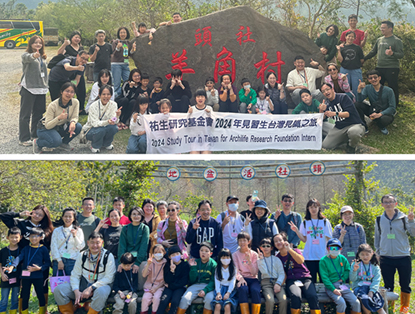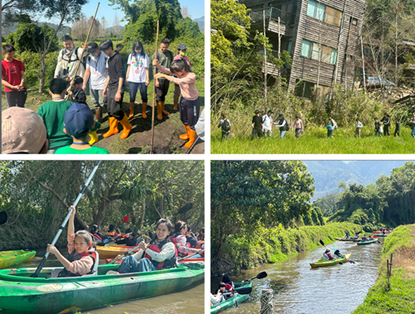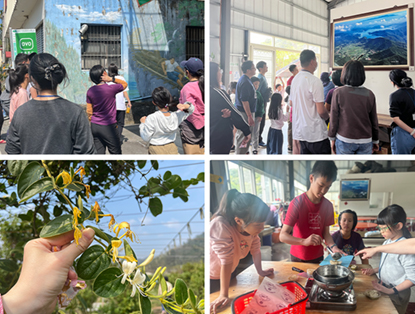Sketch of Archilife Study Tour, February 2024Date: 2024-03-23
Section: Activity |  2月份見識之旅活動,於2024年2月25日由呂明澐小姐帶領29位祐生見習生及家長們,至南投進行日月潭活盆地生態暨水土保持教育之旅。上午前往南投縣魚池鄉頭社村,當眾人踏上看似平凡無奇的草地,卻隨即感受到地面的奇妙晃動,導覽員鼓勵見習生們可大膽地以跳動的方式確認地面是否柔軟又有彈性,原來此處是早期「日潭」的潭底,湖泊消退形成沼澤,先民為了種稻,以各種草莖纏繞木頭承載耕作泥土於沼澤濕地上,打造浮在水上的田,時間一久,沼澤表層是土,下方還是泥炭沼澤,保留了腐植質化的植物殘體,積累並形成泥炭層的土壤類型。導覽員展示了一個有趣的實驗,眾人使用約四公尺長的竹竿插入已挖掘的坑洞裡,從取出的竹竿上的泥漬,可發現過半的竹竿都沒入土裡,直觀地顯示出泥炭土層的深度。土壤層厚、富含水分且吸附力強,竹竿很難拔出,見習生們拿著竹竿與草泥炭土層玩起了拔河,趣味橫生。隨後,來到進行獨木舟體驗的中央大排灌溉渠道,這條原為灌溉農田的渠道,因應產業轉型和與自然共存的心態,居民將其改造成如今的生態旅遊景點。大家在運河上進行划獨木舟體驗,一邊划船、一邊欣賞沿途美景,柳岸堤防和茄苳林蔭映入眼簾,四周環繞鬱蔥的山林,風光如畫,令人流連忘返。 2月份見識之旅活動,於2024年2月25日由呂明澐小姐帶領29位祐生見習生及家長們,至南投進行日月潭活盆地生態暨水土保持教育之旅。上午前往南投縣魚池鄉頭社村,當眾人踏上看似平凡無奇的草地,卻隨即感受到地面的奇妙晃動,導覽員鼓勵見習生們可大膽地以跳動的方式確認地面是否柔軟又有彈性,原來此處是早期「日潭」的潭底,湖泊消退形成沼澤,先民為了種稻,以各種草莖纏繞木頭承載耕作泥土於沼澤濕地上,打造浮在水上的田,時間一久,沼澤表層是土,下方還是泥炭沼澤,保留了腐植質化的植物殘體,積累並形成泥炭層的土壤類型。導覽員展示了一個有趣的實驗,眾人使用約四公尺長的竹竿插入已挖掘的坑洞裡,從取出的竹竿上的泥漬,可發現過半的竹竿都沒入土裡,直觀地顯示出泥炭土層的深度。土壤層厚、富含水分且吸附力強,竹竿很難拔出,見習生們拿著竹竿與草泥炭土層玩起了拔河,趣味橫生。隨後,來到進行獨木舟體驗的中央大排灌溉渠道,這條原為灌溉農田的渠道,因應產業轉型和與自然共存的心態,居民將其改造成如今的生態旅遊景點。大家在運河上進行划獨木舟體驗,一邊划船、一邊欣賞沿途美景,柳岸堤防和茄苳林蔭映入眼簾,四周環繞鬱蔥的山林,風光如畫,令人流連忘返。
 For the study tour of February 25, 2024, Ms. Lu Ming-yun led 29 ARF interns and their parents on a trip to learn about soil and water conservation, and ecosystem, of Sun Moon Lake live basin in Nantou. Stepping on the seemingly ordinary grass field upon reaching Toushe Village in Yuchih Township, Nantou County, everyone was intrigued by the wavy motion of the ground. The tour guide encouraged interns to jump up and down to test if the ground was indeed soft and bouncy. Long ago, the field used to be the bottom of a lake, which gradually dried up to become a swamp. To plant rice, early people would bind logs with plant stems to carry soil, which are then placed on top of the swamp to form a floating rice field. Over time, the surface of the swamp is soil but the bottom is still peat bog, retaining an accumulation of decomposed plant materials. Demonstrating an interesting experiment, everyone was told to stick an approximately 4m long bamboo pole into a pre-dug hole in the swamp. Over half of it went into the mud, indicating the depth of the peat bog. As the soil layer is very thick, highly absorbent and rich moisture, it was difficult to pull out the pole. The interns even made a fun tug-of-war game pulling the pole against the peat bog. Next, everyone went kayaking in a large drainage ditch, which was originally used for farm irrigation. Due to industry transformation and effort to co-exist with nature, residents had converted it into an eco-tourism spot. While kayaking, everyone was enthralled by the beautiful scenery of the embankment, red cedar forest, and surrounding mountains. For the study tour of February 25, 2024, Ms. Lu Ming-yun led 29 ARF interns and their parents on a trip to learn about soil and water conservation, and ecosystem, of Sun Moon Lake live basin in Nantou. Stepping on the seemingly ordinary grass field upon reaching Toushe Village in Yuchih Township, Nantou County, everyone was intrigued by the wavy motion of the ground. The tour guide encouraged interns to jump up and down to test if the ground was indeed soft and bouncy. Long ago, the field used to be the bottom of a lake, which gradually dried up to become a swamp. To plant rice, early people would bind logs with plant stems to carry soil, which are then placed on top of the swamp to form a floating rice field. Over time, the surface of the swamp is soil but the bottom is still peat bog, retaining an accumulation of decomposed plant materials. Demonstrating an interesting experiment, everyone was told to stick an approximately 4m long bamboo pole into a pre-dug hole in the swamp. Over half of it went into the mud, indicating the depth of the peat bog. As the soil layer is very thick, highly absorbent and rich moisture, it was difficult to pull out the pole. The interns even made a fun tug-of-war game pulling the pole against the peat bog. Next, everyone went kayaking in a large drainage ditch, which was originally used for farm irrigation. Due to industry transformation and effort to co-exist with nature, residents had converted it into an eco-tourism spot. While kayaking, everyone was enthralled by the beautiful scenery of the embankment, red cedar forest, and surrounding mountains.
 中午眾人隨著導覽員的步伐來到頭社村的彩繪牆前,壁畫描繪了村莊過去的產業和生活方式,讓人一窺昔日四季稻作農事景象。頭社村曾以伐木、稻米種植等為主要產業,其中最為引人注目的是描繪木業運輸的彩繪牆,生動的畫面展示早期在山中運輸木材的險峻環境,在交通工具無法到達的地方,先人們運用智慧和有限的資源克服困難,展現了那段時光的辛勤艱苦。導覽員也特別介紹路旁的洗衣場,頭社盆地屬於水里溪上游集水區,農業社會年代水源豐沛,居民不僅飲用溪水和泉水,還在此設立洗衣場洗滌衣物,成為居民交誼重要場所。下午進行茶樹手工皂DIY,在導覽員的細心指導下,眾人將當地盛產的絲瓜製成的絲瓜酪結合澳洲茶樹汁液,加入融化的皂基中,製作出屬於自己的天然手工皂。最後來到金銀花籬下採花製成天然香包,金銀花因初開時是白色,後來轉為黃色,故而得名。金銀花是藥用植物,黃色的花朵採下可以生吃、泡澡或可晾乾後做成金銀花茶,其香氣沁人心脾,令人陶醉。體驗活動不僅增添了許多趣味,也讓我們對自然植物的應用有了更深的認識和理解。今日的旅程充滿了驚喜與感動,從活盆地的地質奇觀,到生態運河的美景,再到文化歷史的探索和DIY製作,每一個環節都能深刻感受到這片土地的魅力和豐富的文化底蘊。至此,本日活動已近尾聲,大家一起合照留念後搭車返程,並期待於下次見識之旅再相見。 中午眾人隨著導覽員的步伐來到頭社村的彩繪牆前,壁畫描繪了村莊過去的產業和生活方式,讓人一窺昔日四季稻作農事景象。頭社村曾以伐木、稻米種植等為主要產業,其中最為引人注目的是描繪木業運輸的彩繪牆,生動的畫面展示早期在山中運輸木材的險峻環境,在交通工具無法到達的地方,先人們運用智慧和有限的資源克服困難,展現了那段時光的辛勤艱苦。導覽員也特別介紹路旁的洗衣場,頭社盆地屬於水里溪上游集水區,農業社會年代水源豐沛,居民不僅飲用溪水和泉水,還在此設立洗衣場洗滌衣物,成為居民交誼重要場所。下午進行茶樹手工皂DIY,在導覽員的細心指導下,眾人將當地盛產的絲瓜製成的絲瓜酪結合澳洲茶樹汁液,加入融化的皂基中,製作出屬於自己的天然手工皂。最後來到金銀花籬下採花製成天然香包,金銀花因初開時是白色,後來轉為黃色,故而得名。金銀花是藥用植物,黃色的花朵採下可以生吃、泡澡或可晾乾後做成金銀花茶,其香氣沁人心脾,令人陶醉。體驗活動不僅增添了許多趣味,也讓我們對自然植物的應用有了更深的認識和理解。今日的旅程充滿了驚喜與感動,從活盆地的地質奇觀,到生態運河的美景,再到文化歷史的探索和DIY製作,每一個環節都能深刻感受到這片土地的魅力和豐富的文化底蘊。至此,本日活動已近尾聲,大家一起合照留念後搭車返程,並期待於下次見識之旅再相見。
Everyone followed the tour guide to the mural walls in Toushe Village around noon. The murals gave everyone a glimpse of the village's early industries and way of living, which mainly involved logging and rice planting. The most eye-catching wall was the one depicting transportation of logs in the mountains where, vehicles could not reach. It showed the hardship of those times and how early people used their wisdom and limited resources to overcome difficulties. The tour guide also introduced the laundry area on the roadside. As Toushe basin is part of the upstream catchment area of Shuili River, residents of the farming society not only drank river water and spring water, they also washed their clothes in the river, making it a vital place for residents to socialize. During the DIY tea tree oil soap-making session, everyone made his own natural soap by adding a blend of loofah curd and Australian tea tree oil into melted soap base. The last activity was making natural sachet with fresh honeysuckle flowers. Being an aromatic medicinal herb, honeysuckle flowers may be eaten fresh, used in bath, or made into tea after drying. DIY activities are not only fun but also give us a deeper understanding of plants. Filled with surprises and touching moments, the enchantment of this land and its rich culture can be felt in every part of the tour. As the day's tour came to an end, everyone took a group photo before heading back home and looked forward to the next study tour.
|
|